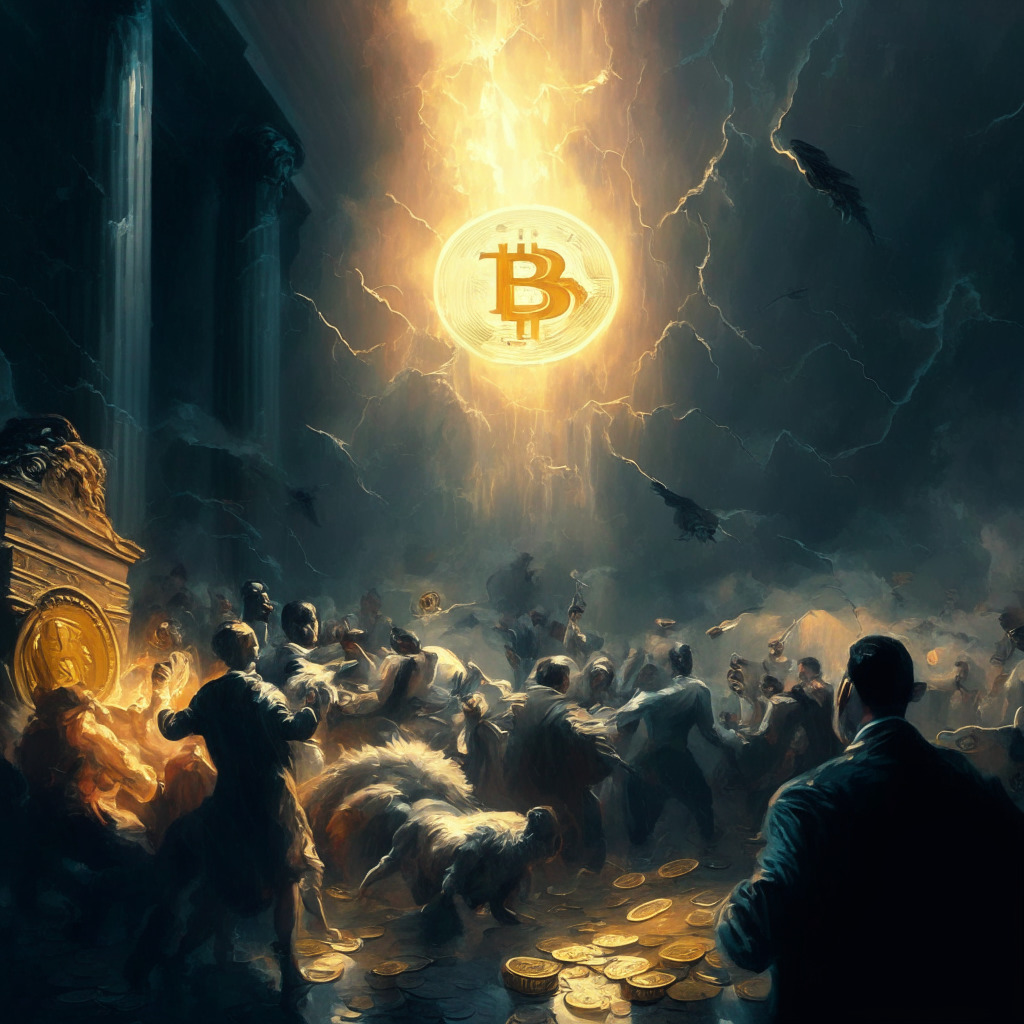Marc Cuban’s experience with registering a crypto token reveals the challenges small businesses and startups face in the current regulatory landscape, including high costs, lengthy delays, and complex rules. Simplifying the registration process and providing clear guidelines could potentially lead to a more vibrant and compliant crypto market, benefiting the industry and investors alike.
Search Results for: Crypto Climate Accord
Crypto Markets Dive as Fed Signals Interest Rate Hikes: A Temporary Downturn or Future Reality?
The crypto market experiences turbulence following regulatory actions and Federal Reserve’s uncertainty on interest rate hikes, with Cardano losing 22% in value in a week. This downturn raises debates on cryptocurrency investments as traditional financial instruments offer higher yields.
Crypto Market Turbulence: Analyzing the Impact of Fed Decisions and SEC Actions
Bitcoin’s price tumbles below $25,000 amid a hawkish Federal Reserve announcement and SEC legal actions against Coinbase and Binance. With increasing macroeconomic uncertainty and regulatory hostility, the crypto market faces challenges, but proponents maintain its resilience and adaptability.
University of Toronto Joins Ripple’s Blockchain Initiative: Pros, Cons, and Impact on Crypto Industry
The University of Toronto collaborates with Ripple to launch an XRP ledger validator as part of Ripple’s University Blockchain Research Initiative (UBRI) in Canada. This partnership aims to support blockchain and crypto technology research and provide students with opportunities to develop skills for crypto-native careers.
Navigating Regulatory Challenges: Simplifying Crypto Exchange Corporate Structures
Amidst regulatory challenges and liquidity issues, Bitcoin and Ether continue to show resilience. Crypto enthusiasts now discuss the need for simpler corporate structures for crypto exchanges, as Binance faces dual cases from CFTC and SEC. The debate on the benefits of uncomplicated structures for crypto companies continues to gain attention.
SEC Pressure on Crypto Exchanges: eToro and Robinhood’s Compliance Commitment
As the SEC increases regulatory pressure on cryptocurrency exchanges like Binance and Coinbase, major platforms, including eToro, emphasize their commitment to compliance and collaboration with regulators. This ensures access to a variety of asset classes for investors, shaping the crypto industry’s future while promoting investor protection and fostering innovation and growth.
Bear Market Fears Loom: How Stock Market Crash Might Affect Bitcoin and Crypto World
Market expert John Hussman raises concerns about a potential bear market, citing overvalued stocks and poor investor sentiment. This bearish outlook may affect the crypto market, with some experts predicting Bitcoin’s price to plummet and warnings against purchasing cryptocurrencies in the uncertain climate.
Shutting Down TradeBlock: A Warning Sign for Crypto Firms Amid Regulatory Hurdles
Digital Currency Group (DCG) is shutting down its trading and prime brokerage services unit, TradeBlock, on May 31 due to the ongoing crypto winter and regulatory uncertainties in the US. This closure highlights the challenges faced by crypto companies in the current economic and regulatory environment, emphasizing the need for adaptability and resilience in developing business models within the digital asset market.
US Debt Default Threat: Implications for Bitcoin, Ethereum, and Global Crypto Market
The U.S. risks its first-ever debt default, potentially impacting global markets and cryptocurrencies, including Bitcoin and Ethereum. Cryptocurrency markets face uncertainty, and the larger question is whether lawmakers can find a permanent solution to ease financial market tensions.
Green Proofs of Bitcoin: A Step Towards Sustainable Crypto Mining and Transparency
Energy Web has launched the Green Proofs of Bitcoin (GP4BTC) registry, aiming to address environmental concerns by tracking miners’ energy inputs and their impact on electric grids. The registry evaluates miners on renewable energy credit purchases and participation in demand response programs, promoting transparency in their energy sources and supporting a greener crypto industry.
Debt Ceiling Talks and Crypto: Navigating Market Uncertainty & Potential Outcomes
Amid debt ceiling deal talks, the stock market experienced a dip and fears of a market crash loom. Crypto investors and enthusiasts must remain vigilant, understanding the profound market effects of these ongoing discussions and stay informed on potential impacts.
Bitcoin 2023: Navigating Regulation & Cryptocurrency’s Response to Anti-Crypto Forces
At the Bitcoin 2023 event, a panel discussed the “dire” regulatory environment and its impact on the cryptocurrency industry. Panellists emphasized the importance of collaboration, education, and cooperation with regulators to address challenges and uphold American values, while acknowledging divergent opinions on the industry’s response to regulation.
Pakistan’s Crypto Ban: Safeguarding Economy or Hindering Financial Freedom?
Pakistan’s Senate Standing Committee on Finance seeks to ban cryptocurrency use amid economic difficulties, with inflation hitting 36% in April 2023. The country’s financial policymakers view cryptocurrencies as high-risk, fearing potential financial terrorism and further strain on IMF relations. Critics argue that cryptocurrencies can act as a hedge against inflation in economically unstable nations.
Navigating Crypto’s Regulatory Limbo: The MechaFightClub Shutdown & Future of Blockchain
The uncertain regulatory environment in the US, driven by the SEC’s intensified enforcement actions, has caused Irreverent Labs to halt development of its NFT game, MechaFightClub, on Solana. The company cites regulatory confusion as a major obstacle to industry growth and plans to pivot towards artificial intelligence projects.
Middle East’s First Immersion-Cooled Crypto Mining: Is It The Future Amid Potential US Taxation?
In partnership with Zero Two, Marathon Digital plans to establish the Middle East’s first large-scale immersion Bitcoin mining operation, utilizing excess energy in Abu Dhabi for a sustainable approach. This pioneering venture might prompt a global shift towards eco-friendly solutions and infrastructure development in digital asset mining.
DAME Tax Debate: Balancing Crypto Mining’s Environmental Impact and Industry Growth
The Digital Asset Mining Energy (DAME) tax proposed by the Biden administration aims to make crypto miners pay for environmental impacts, sparking debate on its fairness. Critics argue the tax overlooks renewable energy sources, technology advancements, and potential environmental benefits provided by mining. Open discussions could help develop a balanced, viable solution for sustainable industry growth.
UK’s Rise as a Crypto Powerhouse: Pros, Cons, and the Future of Blockchain Technologies
The UK is emerging as a leading crypto hub with its robust financial infrastructure and supportive policymakers. London has been recognized as one of the best cities for crypto businesses, and the country’s government emphasizes the importance of a central bank digital currency and aims to lead in Web3 and metaverse advancements.
Pandemic Accelerates Demand for Eco-Friendly HPC: Solidus AI Tech’s Impact on Metaverse & AI Growth
Solidus AI Tech, an advanced computation network, offers eco-friendly high-performance computing (HPC) power for complex AI projects. They aim to address rising demand through green energy locations, energy-efficient IP, stringent data security measures, and supporting the Crypto Climate Accord.
The Green Shift: Bitcoin Leaps Towards Sustainability, Boosting Investor Interest
“A recent Bloomberg report suggests more than half of the power fuelling the Bitcoin ecosystem is sourced from renewable means, driving a movement towards sustainability within the crypto-verse. The trend towards greener practices could potentially attract institutional investor interest and inspire a sustainable crypto industry without sacrificing cash inflow.”
Unraveling the Blockchain Drama: The W&K Info Defense vs. Craig Wright Saga Continues
A U.S. court denied a request by W&K Info Defense to impose criminal sanctions on Craig Wright for incorrectly filling a vital financial disclosure statement. While rejecting the request, they permitted some civil sanctions to proceed. Concerns were raised about incomplete disclosure of Wright’s financial details, including bitcoin holdings.
Coinbase’s New Expansion: A Strategic Move or Industry Pressure?
Coinbase, a top crypto exchange, aims to expand to non-U.S. markets, prioritizing countries with clearer crypto regulations. The company’s strategy includes acquiring licenses, setting operations, and registering in these markets. It points to a lack of crypto-forward regulation in the U.S., potentially impacting its influence in the crypto field.
Decentralized Exchange Brine Fi Secures $16.5M Amid Market Slump: A Game Changer or Mirage?
“Decentralized exchange Brine Fi has secured a $16.5 million investment led by Pantera Capital, despite the recent dip in venture capital for digital assets. Based on Ethereum scaling system StarkWare, Brine Fi offers a non-custodial, decentralized orderbook with privacy for trading positions. Pantera Capital praises its potential for mainstream and institutional adoption in DeFi.”
New Financial Regulations Tease Blockchain Future: Navigating the Dynamic Between Optimism and Ambiguity
“The United States Financial Accounting Standards Board (FASB) is implementing regulations in 2025 that let firms report their digital asset holdings quarterly, eliminating financial misperception caused by impairment losses. This provides optimism for tech firms and digital asset companies, despite existing ambiguity surrounding institutions like the SEC.”
Decoding RECs: Jacobi’s Green Solution to Bitcoin’s Energy Issues and the Regulatory Hurdles
Jacobi Asset Management’s new initiative involves decarbonization achieved through investments in Renewable Energy Certificates (RECs). Through this, Jacobi aims to account for Bitcoin’s carbon footprint in their ETF. However, despite success in Europe, stricter regulation in the US provides notable hurdles for such climate-friendly investments.
Upcoming Jackson Hole Symposium: A Turning Point for Bitcoin’s Market Turmoil?
“The markets face potential volatility amidst concerns of Bitcoin’s latest price changes, affected by rising unrealized losses and external factors such as statements at the Jackson Hole Economic Symposium. Despite investor fear and the recent 11% BTC drop, historical patterns suggest potential for robust recovery.”
BRICS Digital Currency Debate: The Future of Global Trade or Merely a Fantasy?
Experts from Brazil anticipate BRICS summit discussions on a potential digital fiat currency, with workgroups likely being established for the initiative. A collective digital currency could potentially replace the US dollar in trade deals among BRICS nations despite sceptical voices. Individual nations within the BRICS alliance, including China, Russia, and Brazil, have already initiated their own Central Bank Digital Currency (CBDC) projects.
Impending Bitcoin Boom? Examining Market Signals and Global Economic Factors
“A decline in Bitcoin’s short-term holders and record-low volatility could suggest an impending bull market. A recent report indicates this narrow trading range has happened only twice in Bitcoin’s history, prompting speculation about significant market movement. However, these indicators don’t guarantee outcomes with shifting global economic conditions.”
Deciphering Market Signals: Bitcoin Shorting Subsidizes Amidst Potential Surprise Volatility Surge
The shorting of Bitcoin seems to be decreasing, with the destructive influence of the past three months starting to wane. However, the exit from Bitcoin-related funds and intense regulatory scrutiny have created notable market challenges. Yet, analysts highlight potential imminent volatility, suggesting an eruption in the Bitcoin marketplace may be near.
Bitcoin’s Precarious Perch and Tether’s Depreciating Peg: Understanding Current Market Dynamics
“As Bitcoin continues to balance above $29,000, the crypto market fluctuates, particularly due to Tether’s unstable standing. Unusual dynamics in the stablecoin potentially impacts the volume and exchange value of other cryptocurrencies. Bitcoin’s present downturn might lower its worth to the $28,200 mark.”
Ripple Case Verdict Sparks Debate About Future of Digital Asset Regulation
The recent verdict in the Ripple case, acknowledging XRP as a security for institutional investors but not public sales, has sparked debate. Critics argue the decision creates a new asset class, shifting identities between securities and non-securities. Proponents, such as Ripple’s CEO Brad Garlinghouse, see potential for this ruling to shape crypto regulations. Overall, uncertainty pushes for Congress to provide clearer digital asset laws.
Coinbase Shares Surge on Ripple Verdict: An Overreaction or Insightful Investment?
Coinbase stocks rose 24% after a court ruling favored Ripple over the SEC, stating XRP isn’t a security. However, Berenberg bank suggests this could be an overreaction; the ruling didn’t dispute the SEC’s contention about Coinbase’s unregistered status and potential securities law violations. The bank maintains a cautious approach.
Navigating the Current Blockades: The Ups and Downs of Bitcoin’s Struggle against Regulatory Barriers
“Former CFTC Chair, Tim Massad, calls for basic market and investor protection standards for crypto commodities. Bitcoin’s value is influenced by several factors including demand, regulatory decisions, and economic conditions. Despite a recent dip, research suggests a potential surge to $120,000 by 2024.”































